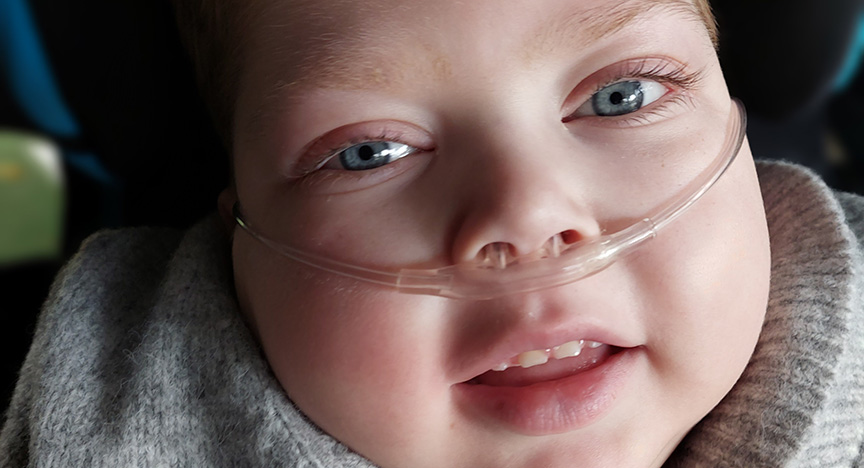
Despite doctors’ concerns that he may not see his first birthday, 5-year-old Kyran continues to defy the odds.
Kyran was a healthy newborn who smiled and giggled at his 3 big sisters as he grew older.
But at 4 months, he began having serious feeding issues and would quickly fatigue when he was playing.
“He was able to jump for short periods in his Jolly Jumper, but he would tire quite fast. I just assumed he needed a bit more time to develop,” his mum Carissa said.
Kyran also became increasingly irritable.
“I was finding it harder to keep Kyran happy and settled. He was getting agitated and not just at the normal ‘witching hour’.”
He had a severe allergic reaction to his first taste of baby yoghurt when he was 6 months old and was rushed to the local hospital. Kyran was then referred to an allied health care team to help with his feeding, including a speech pathologist, physiotherapist and dietician.
“At 8 months I knew something was definitely wrong,” Carissa said. “We visited with allied health and Kyran had only gained 10 grams of weight in a month. His reflux and vomiting was also getting worse, so we went to the emergency department at Caboolture Hospital to find out what was happening with our little boy.”
Kyran was admitted for extensive testing and referred to the Queensland Children’s Hospital to confirm a suspected diagnosis.
After a month in hospital, Kyran was diagnosed with Krabbe disease, a rare life-limiting genetic condition that affects the development and function of the nervous system. There are less than 20 people with the condition in Australia and the average life expectancy is less than 2 years.
“We were told Kyran was well advanced in the first stage of the disease. Doctors carefully let us know they didn’t expect him to live many months past one,” Carissa said. “We were absolutely heartbroken.”
Carissa said the medical team at the Queensland Children’s Hospital responded quickly to Kyran’s needs.
“We were placed in the paediatric palliative care service straight away. We had teams across neurology, metabolics, general paeds, dietetics, physio, allergies and social work. This was all very new for our family and palliative care was amazing in helping us to negotiate all these paths.
“The palliative care team worked closely with metabolics and paediatrics to come up with a pain management plan to help Kyran with what we now know is nerve pain.”
Carissa said Kyran’s diagnosis changed her family’s perspective on life.
“In the early stages of Kyran’s disease, I just wanted to curl up and cry all day. I did this for a little while but soon realised I was wasting Kyran’s short life by locking myself away,” Carissa said.
“We quickly recognised the importance of being all together and decided to do everything we could to create amazing memories for us all while we had our family complete.
“I also wanted to make sure I ‘ticked off’ all the things I wanted Kyran to experience like going on a plane, train, bus, boat etc. We did road trips together, bought a camper trailer and started going camping. This was the best decision we have made. Camping is our new respite. Even though it’s more work, we love it and Kyran loves us all being so close.”
Carissa said support from the palliative care service gave their family the confidence to make the most of every day.
“The 24/7 service has helped us on so many late-night occasions. It’s a huge relief to know you are only a call away from not only help, but someone you know, to help you through difficult times. We’ve had quite a few close calls with Kyran’s health and the palliative care team have been with us at every step of the way.”
Carissa and her family play an active role in decision-making with Kyran’s medical team and doctors believe this approach contributes to Kyran’s quality of life as he continues to exceed expectations.
“Kyran is now 5 and a half years old. He is blowing the doctors away with how strong he is,” Carissa said.
“We celebrate Kyran’s birthdays in a huge way, never knowing if it will be his last. We go all out and make them fun for all our family and friends to enjoy.”
Carissa said while they have a lot to celebrate, their journey has also been challenging.
“I think the hardest part about being part of the paediatric palliative care service is a constant reminder that you have a child who is sick and going to die early. There are days when it’s okay to just feel sorry for yourself. But I make those days short and continue on. Just because we have a boy who receives palliative care doesn’t mean we just watch him die. We actually watch him live.”